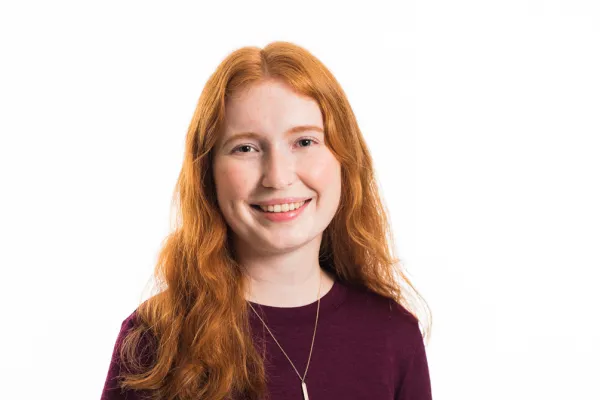Smith Scholarship Initiative Helps Smithies Find and Amplify their Voices
Published October 10, 2023
What’s the secret sauce for doing good in the world? Marta Almazovaite ’24 has the answer: It’s all about collaboration. “I strongly believe that no intentional, large-scale positive change can come about without relationship building and effective communication,” says the Lithuanian-born senior from Oklahoma.
At Smith, Almazovaite is studying psychology to better understand how people can interact “in more honest and meaningful ways.” Her work as a Student Research in Departments (STRIDE) scholar, performing research on collaborative leadership, started her fascination with organizational psychology, which she hopes to study in graduate school.
A self-proclaimed “recovering perfectionist,” Almazovaite has learned at Smith to suppress her previous practice of appearing to be on top of things, even when she wasn’t. She now routinely turns to others and revels in the creative give-and-take between people that can uncover new directions. Last summer’s internship is a case in point. Almazovaite had zero leads, so she turned to a Smith professor who helped her connect with a research project at The Wharton School, overseen by a leading expert in organizational psychology. The stipend offered by Smith’s Praxis program made this exciting opportunity in Philadelphia possible.
Almazovaite feels that financial aid helps create the environment for the “most good being done in the world” by multiplying ideas and insights. “When more people are able to show up and are invited in, more life stories and pathways are present. Change that comes out of these academic spaces can encompass more of the human experience.”
She adds, “Everyone deserves to have community and art and intellectual conversation and beautiful spaces. Financial aid makes sure that these are not denied for reasons people have no control over.” But Almazovaite knows that it doesn’t end there. “Getting people in the room is crucial, but it’s only the first step. There’s a lot of work to be done to make sure that diverse perspectives are actually heard.”
Here, Marta talks about the strong sense of belonging she feels in the Smith community and how it has helped her grow.
“Smithies speak up about what they care about and only get louder if someone tries to silence them!”
Why Smith?
The close-knit community drew me in. The house system is unique and I loved the campus! It all felt—and still feels—very inviting. The academic opportunities that Smith offered also stood out. I was accepted into the STRIDE program when I was admitted, which allowed me to do funded research for two years immediately upon entering, an incredible opportunity I would not have had elsewhere.
What does being a Smithie mean to you?
Being a Smithie means standing up for myself and the people I care about. It means putting in the work to see and combat injustice instead of accepting it as normal. Smithies speak up about what they care about and only get louder if someone tries to silence them! Being a Smithie means being hardworking but also knowing how to have fun and appreciate the people we’re with.
What has financial aid meant to you?
Knowing that I have a debt-free future makes it possible for me to make the most out of my time here. Smith’s generous financial aid makes me feel that this community wants me.
What is your favorite thing at Smith?
So hard to choose! I love walking through such an amazing physical space every single day. The trees and leaves and flowers and snow and water—they relax and ground me. And the buildings are so aesthetically pleasing. On a more abstract level, I’ve loved the safety and comfort that I feel at Smith, and also the way that I can be intellectually challenged.
What achievement at Smith are you proud of?
I’m proud of my STRIDE project. Working with Erin Cohn ’00 [director of the Wurtele Center for Leadership], I researched collaborative leadership in the classroom. I interviewed students to explore what effective teamwork looks like. This is important work—it aims to make leadership more accessible and give people the tools to utilize collaboration for making meaningful change.
Is there a Smith faculty member who stands out for you?
There are four: Erin Cohn, because of her continual support of me and my research goals. Lindsay Poirier [assistant professor of statistics and data sciences], because she’s an incredibly engaging and understanding professor. Maren Buck [associate professor of chemistry], because she’s supportive and kind and caring. And Patricia DiBartolo [Caroline L. Wall ’27 Professor of Psychology], for her wonderful teaching and mentorship. So many women on this campus are amazing, but these four are exceptional.
Who has had the most impact on you?
One of my high school teachers—she taught me what it means to be a lifelong learner and to have unconditional compassion.
Why is it important to give to financial aid?
Financial aid lets students be change-makers regardless of their socioeconomic backgrounds. Financial aid also makes students feel that they are cared for and belong, which is such a necessary part of getting any sort of education. It’s life-changing.
